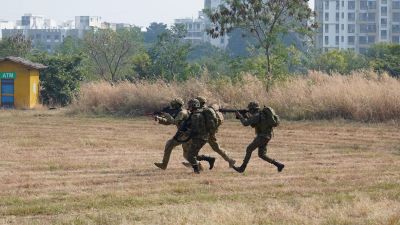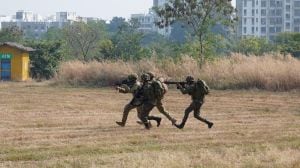Silk vs leather in Pak Foreign Office
The mirror cracked, some days ago in Pakistan. The utterly sophisticated and skillful master-diplomat Inamul Haq, was formally elevated from...

The mirror cracked, some days ago in Pakistan. The utterly sophisticated and skillful master-diplomat Inamul Haq, was formally elevated from his job as Foreign secretary to minister of state of Foreign affairs.
In short order, Pakistan’s ambassador to China Riaz Khokhar is expected to return to take Haq’s place in the Foreign Office. A pugnacious type, Khokhar delights in deliberately shocking his audience. In an 1997 interview he gave India Abroad in his last days as High Commissioner in New Delhi, Khokhar used a swear word to describe Farooq Abdullah.
Many Pakistanis were amused at the time, even as New Delhi could barely disguise dark fury.
Five years later, the seemingly Jekyll-and-Hyde face of the Pakistani foreign office only adds to the already complicated bilateral relationship between the two countries.
To his credit, even as he was recently plotting the removal of his foreign minister Abdul Sattar and sending him into medical exile, General Musharraf probably realised that delivering Haq to the Foreign Office was probably his best survival ticket in the jungle of bloodless diplomacy.
Besieged on all fronts, from Washington to New Delhi, Haq sought to convert the failings of the nation-state into heaven-sent opportunities. As the General thrust himself into the limelight, from Agra to Almaty, Haq quietly and relentlessly worked within the shadows, expanding available space for cooperation with the Western world (on Afghanistan) and limiting danger signals with India.
Above all, during his time as Foreign Secretary, Haq disdained the temptation of demonising the opponent, even though his own boss, the General, would think nothing of reducing India to that simplistic level.
Haq’s impeccable manners are legion, even his detractors will readily admit. For example, his friendship with India’s last high commissioner to Pakistan Vijay Nambiar, forged in the unlikely climes of Beijing (the Sino-Pakistani relationship has been described as a ‘‘tested and all-weather friendship’’ at least for four decades now), where both were ambassadors till 2000.
In the six months between Agra and the December 13 attack on Parliament, Haq and Nambiar found other things in common. Pakistanis readily acknowledge Haq’s gesture—and Indians are quick to appreciate the enormity of it—in going to the airport to bid farewell to Nambiar when he was recalled as part of the set of sanctions that India imposed against Pakistan.
Compare Haq, then, with the more Khokhar, who didn’t think twice of ridiculing his hosts during his term as high commissioner here. In the Indian interview, Khokhar said, ‘‘We are not interested in discussing pop music with India, we are not interested in discussing weather conditions. We are interested in discussing serious matters.’’
At the time, elections were on in J&K. Khokhar didn’t hesitate in describing them variously as a ‘‘farce’’, ‘‘a complete fraud’’ and a ‘‘meaningless exercise’’. ‘‘All elections (in Kashmir) in the past have been rigged, the present elections will be rigged and all future elections will be rigged,’’ Khokhar said, pure commitment in his voice.
To think, however, that Haq is a softie would be misreading the picture. He completely believes in the old mantra, of Kashmir being the ‘‘core’’ issue with India. Aware, though, of the recent unacceptability of violence as a political weapon, Haq is also credited with evolving a more sophisticated strategy on Kashmir.
To keep Kashmir on the agenda, Pakistan would do everything possible by extending it ‘‘full moral, diplomatic and political support’’.
As Foreign secretary, Haq was to a large extent responsible for developing Pakistan’s strategy for Agra. When Musharraf told the banquet at Rashtrapati Bhawan in Delhi on July 14 last year, it could have been Haq speaking. ‘‘There can be no military solution to Kashmir. We must be bold enough to face this issue once and for all.’’
Interestingly, the Haq school of thought has quite a few takers in Islamabad, where the expansionist dream is otherwise alive and well. While posted in the US, Khokhar for example told senior editors of the Washington Post that Pakistan had no influence with the Taliban in Afghanistan, despite the fact that it supported that government in Kabul.
Back home, one of Pakistan’s ex-soldiers, Ikram Sehgal of the Defence Journal was openly castigating Khokhar as ‘‘being the wrong man in Washington.’’ In a blistering attack after Pakistan’s tit-for-tat nuclear tests in May 1998, Sehgal wrote about Khokhar’s proclivity of being on the right side of his superiors.
Everyone knows, said Sehgal, that in 1987-89, Khokhar was a ‘‘self-proclaimed’’ Zia man, the Dhaka elite witness to his changing overnight to singing Benazir’s praises which got him to the PM’s secretariat in Islamabad, which in turn got him posted to India.
Later, his connections with then president Farooq Leghari got him the Washington job, where he replaced Maleeha Lodhi as ambassador. After New Delhi, Khokhar moved from strength to strength, going first as ambassador to the US and then to China. Last week, after he was named deputy foreign minister, Haq went on pilgrimage to Beijing, where he was received by none other than Khokhar.
The question, however, is whether Haq will be retained after the October elections in Pakistan or not.If he isn’t, the Khokhar school of thought, blunt and in-your-face, will hold sway in the Pakistani foreign office. If he remains where he is or even elevated, he might be able to neutralise Khokhar.





- 01
- 02
- 03
- 04
- 05


























